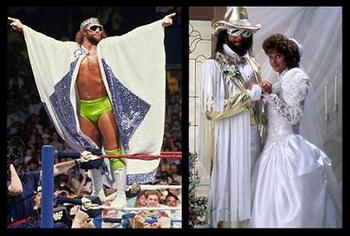
Most of the Twitter world is aware by now that Randy Poffo, a.k.a. Macho Man Randy Savage, passed away earlier today. Amazingly, the death wasn't the "unspecified causes" that most professional wrestlers die from in their mid-40s to early 60s, but a car accident. If you wrestled professionally in the 1980s, you probably feel a little bit like you're 55 minutes into a Final Destination movie.
For those of you who didn't grow up male during the 1980s or 90s, The Macho Man was a big deal; not quite Hulk Hogan big, but not too far off. In hindsight, the Macho Man gimmick is almost impossible to explain. A somewhat-rednecky guy with a peculiar accent wore flamboyant clothing (see picture above), and America loved it. I certainly loved it. He wasn't a good wrestler, exactly (his matches tended to run a little long and tended to become too punch-and-kick focused), but in his heyday there were few more entertaining characters.
The Macho Man character is itself something of a hybrid between the two wrestling archetypes. The first archetype is to take some occupation or ethnicity--a repo man, or a waste management employee, or a Native American, or an accountant--and play every stereotype at maximum volume. When these characters go out of style, wrestlers become ordinary everyman-type dudes that wear normal clothing and fight to settle their differences.
But what was Macho Man, exactly? Someone from Mars or France or Manhattan who has no idea what professional wrestling is would look at the picture above, hear "Macho Man," and assume that Savage was a play off of gay culture or faux-aggressive effeminacy, but he most certainly was not that (the WWF wasn't subtle when it chose to play that angle). Yet he wasn't an ordinary person either, even by 1980s standards. A musclehead in a cowboy costume laced with psychadelic toilet paper and speaking in California beach lingo with a half-Creole accent doesn't seem like an emotionally powerful trigger, but for years it resonated powerfully with audiences. Men cried at his "wedding," which took place in an arena on national television wearing a gigantic hat.
Eventually the shtick felt silly, even by professional wrestling standards. Savage reinvented himself, with some success, as ordinary badass but even then couldn't quite relinquish the flair. The moment was gone, and professional wrestlers tend not to fade gracefully.
There will be some jokes about his death today, and most of them will be distasteful, and I will laugh at them regardless. Still, allow me this moment of respect for a person who's death of a person who reached the apex of his calling, however silly or inconsequential that calling may have been.